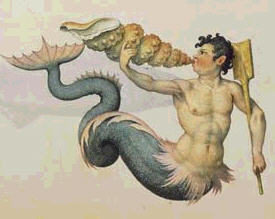By this familiar connection there was always a correspondence between the court in Ferrara and in Milano. Decembrio wrote the life of Filippo Maria Visconti short after Filippos death (1447). In the Latin text a very expensive (1500 ducatos) playing card deck is mentioned, the Michelino deck. Then a communication between Decembrio and Leonello d'Este occured. Much later, in the 60ies of the 15th century, Polismagna (Dokument 28) translated the text of Decembrio in Italian language. Polismagna used then the term "Trionfi" for the deck.
Ross Gregory Caldwell has explored the details.
"Pier Candido Decembrio (the elder brother of Angelo Camillo), who had been one of the two Milanese orators at the congress, now entered into the service of the Republic, and wrote the life of the late Duke, taking as his model the life of Tiberius by Suetonius. Filippo Maria had died in August, but in October Decembrio had completed the work and sent it to Leonello, as to a kind of literary dictator, to ask his opinion of it, before publishing it. The Marquis professed himself much delighted with the book and flattered at it having been left with him in this way, but strongly advised the author, seeing that his writings would be immortal, either to strike out or to veil what he had said concerning a secret vice of the Duke's. Decembrio wrote back that he had not mentioned this vice to bring infamy to his late Prince, but rather praise and glory, seeing that his not passing it over in silence would make people lend faith to what he reported in his favour. Nevertheless, he altered the passage in deference to Leonello's opinion, and the alteration was much commended by the latter."
Sources:
Rosmini: Vite e disciplina de Guarino Veronese, i. pp. 109,110
Borsa: Pier Candido Decembri, pp. 83, 84).
If Leonello and Decembrio spoke clearly about what this vice was, Gardner does not mention it. In English, a "secret vice" is generally masturbation or sodomy, or some other sexual habit.
[In the article cited by Gardner, Borsa adds: "It seems however that in some copy of the work such an allusion remained, since Giovio in the 'Vite de' dodici Visconti' (p. 123) thus explains "But Candido Decembrio, a writer of that time, full of "bad faith, leaving the praiseworthy things which deserved to be celebrated in Filippo, attributing this pleasure to suspicion of lust" (attribuž quel piacere a sospetto di lussuria).]
The interesting thing is the potential implication for the puzzling Marziano cards passage. Leonello must therefore have known of this deck. It is possible he wanted to find it, just as Marcello did. It was clearly a famous work, as Marcello hears about it.
We might ask what some of the implications of the passage are. We already knew some of the conditions, but the situation is clearer now.
Pier Candido is the older brother of Angelo. Angelo wrote the Politia Literaria, which is an idealized discourse among Leonello, his courtiers, and Guarino. So the Decembrio brothers were familiar with the Ferrarese court - in the 30s and 40s, it must have been the most extravagant humanist court in Italy.
[Borsa adds that since Pier Candido gave it to Leonello for examination before publishing it (and to no one else), it attests to how highly the Ferrara court was esteemed by the humanists in those years, under the auspices of Guarino, a peaceful and welcome retreat for studies.]
Carte da Trionfi were known in Ferrara. Two packs were mentioned there by 1447, when Pier Candido Decembrio sent his work, with the description of Marziano's deck, to Leonello. Yet Pier Candido does not call the deck "carte da trionfi."
Polismagna, who later translated the work for Borso, did in fact call the deck "carte da trionfi". Polismagna must have been familiar enough with carte da trionfi, since Borso commissioned dozens of decks.
But to get back to Pier Candido in 1447, he does not use that term.
Could that indicate that "carte da trionfi" are unknown in Milan, at least by that name?
A second point would be pure speculation - The deck was obviously of great worth. Knowing that Milan was in turmoil, Leonello might well have tried to get the deck himself, since he was a lover of art.


1 / 2 / 3 / 4 / 5 / 6 / 7 / 8
"Petrus Candidus (1399-1477) created
wondrous beasts, often giving
them subtle human characteristics. "